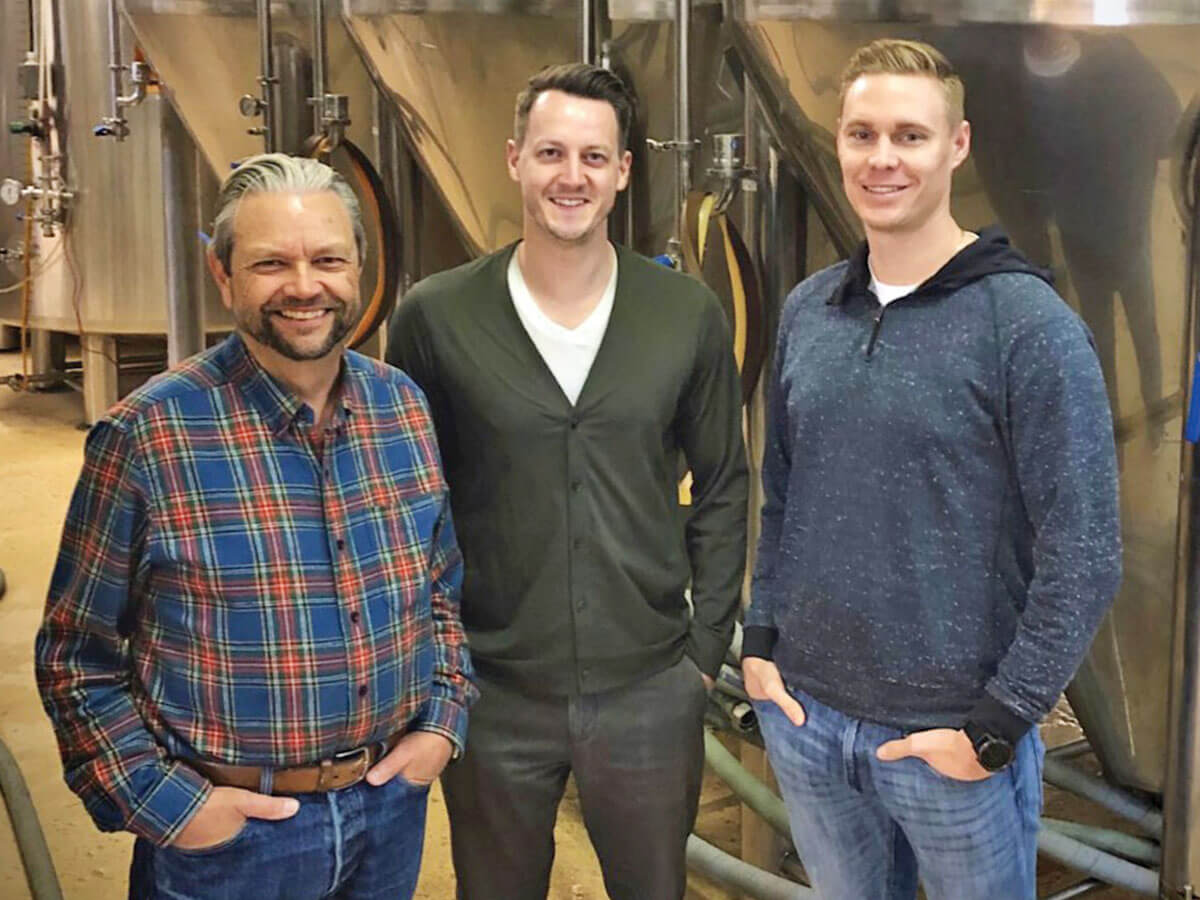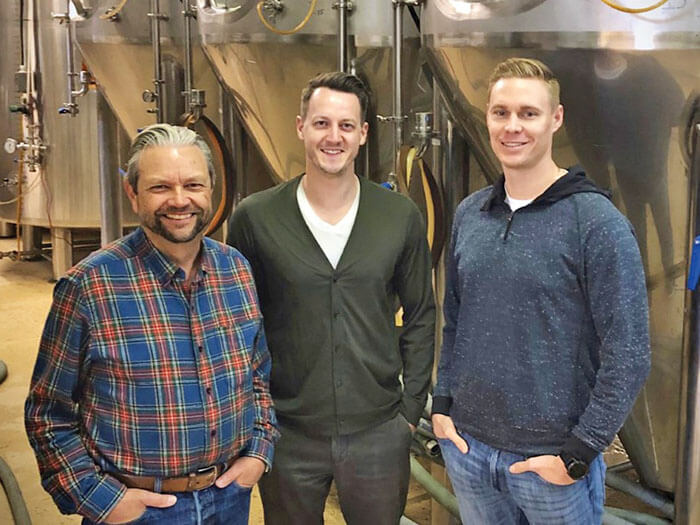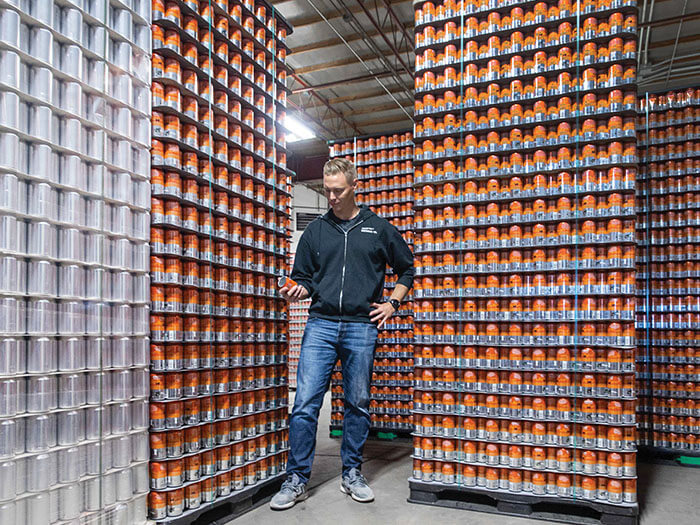
These CPAs bought a brewery—then the pandemic happened
 Alley Kat Brewing co-founder Neil Herbst (left) with successors Zane Christensen and Cameron French (right) (Photograph by Curtis Comeau)
Alley Kat Brewing co-founder Neil Herbst (left) with successors Zane Christensen and Cameron French (right) (Photograph by Curtis Comeau)
It was inevitable that Zane Christensen and Cameron French, friends since grade school, would end up business partners. Christensen became a CPA partly because he’d learned that a number of them run Fortune 500 companies. French, who became a CPA in 2012, felt a similar pull. “I always wanted to be an entrepreneur,” he says. “That was the ultimate goal.”
Craft beer wasn’t exactly part of that goal but, today French and Christensen are the owners of Edmonton’s Alley Kat Brewing Company, one of Alberta’s oldest craft breweries.
For years, the pair brainstormed startup businesses, everything from car washes to liquor stores. At the same time, their taste in beer was maturing. French’s palate developed when he studied economics at Princeton University in New Jersey, a state packed with more than 130 craft breweries. Christensen’s love of better beer grew during a stint working in Belgium, where the beer culture has been officially recognized by UNESCO.
By the time the two were in their 30s and back in Canada, an opportunity bubbled to the surface. In 2018, Christensen applied for an accounting position at Alley Kat, the brewery established by owners Neil and Lavonne Herbst in 1995. Christensen pitched himself as a strategic partner, not just a bookkeeper. The couple balked at his salary expectations, but he sensed that the Herbsts, then in their early 60s, might be open to a different proposal.
“Everything seemed like [they] were looking for an exit,” says Christensen. He told French, who felt that combining his love of business and beer was like pairing barley and hops.
Six months later, in February 2019, Christensen emailed Neil Herbst, who indeed had no firm exit strategy. “It just happened that these guys came along,” he says.
After a year of negotiating, the deal closed in February 2020, and French and Christensen became co-owners of the business. About a month later, a global pandemic took hold.
“COVID threw us a curveball,” says Christensen. “That obviously wasn’t an optimal time to jump into a small business.”
Up until then, Alberta craft beer had been booming. Between 2013 and 2021, the number of independent breweries in the province shot up from around a dozen to more than 130. For many of them, sales of pints to drop-in patrons or kegs to local bars and restaurants were a significant portion of their revenue. When COVID-19 hit, the government turned off the taps, shuttering the entire hospitality industry.
Like many craft breweries, Alley Kat opened an online store and began home delivery. To cover the lag while systems were implemented, they took orders by phone and spreadsheet.
 For Alley Kat co-owner French, combining his love of business and beer was like pairing barley and hops (Photograph by Curtis Comeau)
For Alley Kat co-owner French, combining his love of business and beer was like pairing barley and hops (Photograph by Curtis Comeau)
As the new entrepreneurs watched keg sales plummet, they noticed volumes of canned products saw a year-over-year increase; liquor stores were still open as an essential service and consumer demand kept climbing. Alley Kat was prepared. “We were primarily a packaging brewery,” says Herbst, “a wholesaling brewery.”
French and Christensen’s predecessor, who stayed on in an advisory role during the pair’s first year at the helm, had emphasized two things when growing the company: building a production brewery focused on packaging for widespread distribution and developing a reputation for top quality. When Herbst started the business, the market was largely suspicious and puzzled by the bold flavour, hoppy aroma and even the appearance of craft beer. Cans of Alley Kat’s beers are a fixture in retailers across Alberta.
While its business model remains wholesale-based, Alley Kat is also aligning with the industry’s direction toward taproom culture; craft beer enthusiasts relish new liquor store finds but they also love sampling at the source.
Jason van Rassel, beer columnist for Edmonton’s Edify magazine, sees that as an opportunity. “I think the potential is there for Alley Kat because it’s been unrealized for so long,” he says. “There’s nowhere to go but up.”
Alley Kat’s industrial-area location and facility offer the option for physical expansion and wholesale growth. Christensen believes Alley Kat could scale up with “a bit more equipment and staff . . . without adding much cost.” There are new export possibilities, too—in January 2021, the brewery began selling its zesty raspberry sour in Sweden.
The accounting pair know that, by acquiring an established brand, they began their entrepreneurial journey on second base.
“They have a company that’s very well-known,” Herbst says, “that has some very good brands.”
“We’ve been really fortunate,” adds Christensen.
But the duo isn’t satisfied with maintaining the status quo. When Herbst was Christensen and French’s age, he was building from the ground up. Now, there’s a legacy to build from.
“We’ve got quite a few years left before we’re ready for retirement,” says French. “So, we want to see what we can do and put our own mark on the business as well.”
MEET OTHER ENTREPRENEURS
Read about the sparkling water project with purpose, the discount retail chain and the clothing rental business that focuses on South Asian weddings.